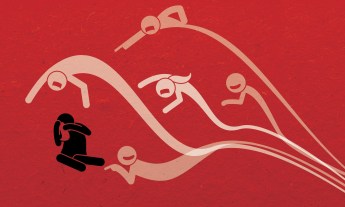
Whether you put on your cap and gown last week — or last century — these honest answers can give you some insight and guidance.
“If you don’t know what you want to do with the rest of your life, you’re not a failure. Give yourself time and get yourself experience to figure things out.”
— Angela Duckworth (TED Talk: Grit — the power of passion and persistence)
“Although I think I already knew this back when I graduated from college, I didn’t do it enough: trust your instincts. Deep inside you, you already know what you need to do to pursue your goals. And just as importantly, do not seek permission to pursue your goals. Pursue them. Only by doing so can you show the world what you had in mind and get the support of others.”
— Alejandro Sánchez Alvarado (TED Talk: To solve old problems, study new species)
“Don’t take yourself, your decisions, your outcomes or even your mistakes so damn seriously. There’s nowhere special to get to and no special accomplishment to check off the list. The moment is now; the place is here; the person is you. Make choices that make you feel alive. But here’s my advice about my advice — I couldn’t have possibly done this myself when I was a new college graduate because I was Wrapped. Way. Too. Tightly. This would have sounded like loosey-goosey hokum to me, and I’d have rolled my eyes and gone back to alphabetizing my soup shelf. Truly, what I wish I’d done differently during the past 20 years is enjoyed the ride and engaged in less hand-wringing over my decisions. I wish I’d trusted myself more, trusted the universe more, trusted the love and support of family and friends more, and realized this: ‘I’m enough, and it’s all going to be great.’ Because it has been marvelous.”
— Casey Brown (TED Talk: Know your worth, and then ask for it)
“It’s okay to quit your first job — even if it was really hard to get it, it paid well, and everyone seemed to admire you for getting it. If you hate your job, you’ll be wasting your life acquiring skills, contacts and a reputation that you don’t want to use. The sooner you find something you love, the better.”
— Tim Harford (TED Talk: How frustration can make us more creative)
“The world can only thrive when people know what they’re talking about. Find the thing that makes you want to know what you’re talking about. Then talk about it.”
— Ruth Chang (TED Talk: How to make hard choices)
“The advice that I wish I’d gotten when I graduated from college is: Pay attention to the difference between the quick hits of excitement that come from that first kiss of a new relationship or job and those feelings you get when you think about your strong connections with family or friends. Don’t get fooled by shiny things — that shine fades over time, while the gold of strong relationships never tarnishes. Remember the differences between these feelings to help you make decisions as you go forward.”
— Judson Brewer (TED Talk: A simple way to break a bad habit)
“1) Your high heels are not too high, even if you are a scientist. Someday, your unusual shoe choice will be just the right height to carry you into prestigious research labs and important business meetings, and help you peer into a wasp nest and discover a microorganism that will change the beer-brewing world. Your heels are just right for your journey. 2) There can be great beauty and great utility in what at first evokes feelings of fear and disgust, so dare to explore. 3) Remember to stop and sniff the microbes. This will probably help you gain perspective, but it will definitely help you discover future microbial technologies.”
— Anne Madden (TED Talk: Meet the microscopic life in your home and on your face)
“Regarding relationships of all categories (platonic, romantic, professional, etc.): Don’t let someone take up your emotional real estate if they aren’t paying rent.”
— Sarah Kay (TED Talk: If I should have a daughter … )
“Never stop learning. When we graduate college and start our careers, we often understand that we have a lot to learn, so we approach our jobs with a learning orientation. We ask questions; we observe others; we know we may be wrong; and we realize we’re works in progress. But once we gain competence in our jobs, too many of us stop learning and growing. The most successful people — in work and in life — never stop deliberately continuing to learn and improve.”
— Eduardo Briceño (TED Talk: How to get better at the things you care about)
“I felt a lot of urgency to ‘do good’ right out of the gate after college, working in nonprofits and government right away. I wish someone had urged me to build my skills instead, so I would have received mentoring on my professional performance and communication early on. Then, when I transitioned into the social good sector, I’d have had a good set of tools and habits to bring with me.”
— Jessica Ladd (TED Talk: The reporting system that sexual assault survivors want)
“Graduation is a euphoric moment, but soon after, people often experience withdrawal symptoms. One reason is that your immediately accessible social network has been pulled out from under you, and entering ‘the real world’ means that you lose the effortless social interaction from dorm life, organized clubs and regular parties. Rather than feeling down, be intentional about maintaining and building a social world that brings out your richest self. And, when you hit your lowest points, in addition to turning to your strongest and closest relationships for support, have the courage to widen both your thinking and your networks as well.”
— Tanya Menon (TED Talk: The secret to great opportunities? The person you haven’t met yet)
“Look for people’s inner worlds. Imagine their hopes and fears and what it feels like to be them. Seeing into other hearts can make you more effective in achieving personal and professional goals. It may also give you the comfort of remembering how deeply alike we all are.”
— Bill Bernat (TED Talk: How to connect with depressed friends)
“I was the first to attend college in my family, so neither my parents nor my siblings could advise me on my graduate school or career plans. I heeded my inner calling and pursued two master’s degrees in information systems at same time, and it all worked out well. Remember: your best academic counselor and career advisor is your heart.”
— Navi Radjou (TED Talk: Creative problem solving in the case of extreme limits)
“I know the anxiety-provoking notion that you have to specialize or you will never become successful is weighing heavily on you right now. There’s good news! It just isn’t true. You can do and be many things and still thrive professionally. Over the next ten years, you’ll meet amazing people who are doing all kinds of things, such as a programmer/comedian/author and a filmmaker/teacher/carpenter. It’s OK to be a complex, multifaceted person who doesn’t fit neatly in one box. In fact, it’s actually a lot of fun.”
— Emilie Wapnick (TED Talk: Why some of us don’t have one true calling)
“Be less afraid of getting older — way, way less afraid. Our fears are way out of proportion to the reality, and we squander a ridiculous amount of our youth worrying about it.”
— Ashton Applewhite (TED Talk: Let’s end ageism)
“Give yourself more time. So many college graduates immediately start wanting to make all their dreams come true at once — this can go wrong in many ways. The first is the frustration that you’re not ‘there’ yet. It’s going to take time to find (or build) your dream career. The second is burnout. If you find your career early, you can find yourself setting all sorts of unrealistic goals with arbitrary deadlines and chase them until you drop from fatigue. You can have it all — but not all at once.”
— David Burkus (TED Talk: Why you should know how much your coworkers get paid)
“Whenever possible, get as uncomfortable as possible. Challenge yourself to get outside of your comfort zone regularly — spend time with people you deeply disagree with, read books about experiences you will never have, travel to places where you don’t speak the language, and take jobs in industries you’ve never worked in before. And if you feel yourself resisting, try again. Those experiences will help you build deep empathy, and we could all use more of that.”
— Anjali Kumar (TED Talk: My failed mission to find God and what I found instead)
“Surround yourself with people who help you be the best versions of yourself. Avoid those who don’t. And get enough sleep.”
—Lisa Feldman Barrett (TED Talk: You aren’t at the mercy of your emotions)
“When I graduated, I wish I’d known the research showing that future success doesn’t lead to happiness. I sometimes got paralyzed by the fear that happiness existed only if I found the perfect job, degree or position. In truth, the research is clear: happiness exists down almost any life path as long as you are grateful for the present, and develop meaningful relationships. Choose optimism and gratitude now and invest more in others, and happiness will be a lifelong advantage as you pursue your dreams.”
— Shawn Achor (TED Talk: The happy secret to better work)
“You don’t have to pursue what you studied. I followed my heart, and now I’m happier and more satisfied with life than I could have ever envisioned. We kill ourselves looking for jobs in our fields of study, while there are a million other things we are able to do. I also wish somebody had told me money doesn’t equate to happiness. When you get a job and start working, don’t forget to live.”
— Kasiva Mutua (TED Talk: How to use the drum to tell your story)
“You don’t have to do something extraordinary to lead a meaningful life; you don’t have to cure cancer, become an Instagram celebrity, or write the Great American Novel. Freud said that the meaning of life lies in love and work. So: In your relationships, lead with love. Be generous, be vulnerable, give of yourself to others, and don’t do the expedient thing just because it’s more convenient for you. Make the effort to put others first. In your career, find work that makes you proud and adopt a service mindset — remember how what you’re doing helps others, no matter how big or small the impact may be. Touching the life of just a single person is a powerful legacy to leave behind. Finally, make gratitude a part of your daily life; don’t save it for Thanksgiving. Every day, reflect on one or two things that happened to you which you’re grateful for. Not only will it make you happier, but it will also put you in touch with what really matters. Then, when you experience setbacks or hardships, it will also be a good reminder of how blessed you really are.”
— Emily Esfahani Smith (TED Talk: There’s more to life than being happy)
“When you finish college and begin your first job or internship, you’ll be keen to learn all you can and impress your employer so you can start on the path to promotions and raises. But the important thing that you might not see amidst all this excitement is the great idea that could someday become a great business or entrepreneurial venture. I’ve found the most interesting employment that life offers is often something of your own creation that you do full time or in addition to your main job. So, after you graduate from college, take the time to identify a venture that you’d like to do by yourself or with friends, and start building it. One day, you’ll be glad you started early.”
— Washington Wachira (TED Talk: For the love of birds)
“Move toward the light — toward people, activities, ideas that make you see more, that nourish you. Do this for at least five years. At that point, you can take stock and decide if you need to do some utterly practical, careerist, traditionally ‘wise’ thing. But give yourself a chance to follow your heart and your mind first. The best careers are built by people who have had a breadth of experiences on which to draw. Don’t get anxious if for a while your life seems to be made of a lot of fragments; in time, they will seem like facets of a diamond.”
— Sherry Turkle (TED Talk: Connected, but alone?)
“That adage about pursuing things you’re passionate about does eventually pay off. When? No one knows. I suppose that’s why it’s a pursuit.”
— David Sengeh (TED Talk: The sore problem of prosthetic limbs)
“It’s traditional at graduation to offer neat, packaged stories of triumph over difficulties. But life isn’t like that — it’s open-ended, subject to a million contingencies and constant change. This doesn’t mean you shouldn’t make plans. But it does mean you should be alert to all the changes in the world and in yourself that could render your plan suddenly obsolete, unattractive or perverse. Be open to change. Be prepared to experiment. Take risks. Keep learning. Make your life your own.”
— Margaret Heffernan (TED Talk: Dare to disagree)











